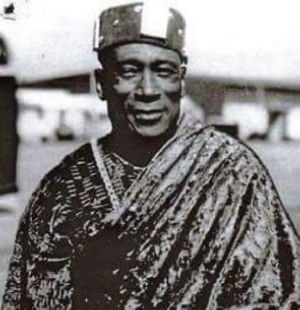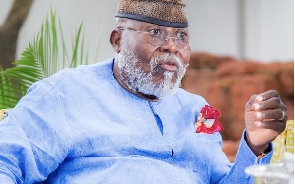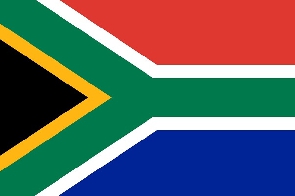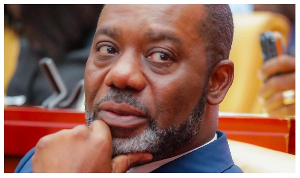- Home - News
- TWI News | TV
- Polls
- Cartoons
- Year In Review
- News Archive
- Crime & Punishment
- Politics
- Regional
- Editorial
- Health
- Ghanaians Abroad
- Tabloid
- Africa
- Religion
- Election 2020
- Coronavirus
- News Videos | TV
- Photo Archives
- News Headlines
- Press Release
- News Blogs
General News of Saturday, 10 August 2024
Source: www.ghanaweb.com
See rare photos from burial of Nii Kwabena Bonne III, the famous Ga chief who masterminded the boycott of European goods
A king is known for several things, including controlling his people and maintaining peace and order in the community he controls.
However, one unusual case occurred when a chief decided to take the bull by the horns and joined in one of the most historic occasions that led to Ghana's independence from colonisation.
He is Nii Kwabena Bonnie III, a traditional leader of Osu Alata Mantse and Oyokohene of Techiman of the then Gold Coast.
Nicknamed Boycott-Hene, he was also the Oyokohene of Techiman, with the stool name Nana Owusu Akenten III.
One of the many interesting facts about the famous Osu Alata Mantse was that he hugely contributed to the fight for Ghana's independence when he orchestrated the 1948 boycott of European goods by Gold Coasters.
As a renowned businessman at the time, he also formed an anti-inflation Committee in Accra in 1947 to protest against inflated goods and rallied other traditional leaders across the then Gold Coast to boycott their territories.
Before the boycott, Nii Bonnie issued a letter, giving an ultimatum to the European firms to reduce their prices by January 24, 1948.
In a letter to the United Africa Company (UAC), a subsidiary of the Anglo-Dutch multinational Unilever, Nii Bonnie notified that failure to reduce prices would lead to a strike.
However, the Europeans failed to adhere to the directive and ignored the ultimatum, the local people then began the strike on January 26, 1948.
Some of the products boycotted by the local people were cotton prints, canned meat, and flour biscuits among others.
Due to the impact of the boycott, the colonial leaders and representatives of the merchants met with Nii Bonnie and other traditional leaders to agree on a price reduction. They reduced their prices from a 75 per cent margin to 50 per cent.
The campaign to boycott European goods led to the 1948 riots and set the tone for the 1949-1951 campaign for independence.
According to reports, on the last day of the boycott (28th February 1948), some colonial ex-servicemen began a march to then-British Colonial Governor and Commander-in-Chief Sir Gerald Hallen Creasy, at the Christiansburg Castle, Osu, to present him with a petition, but the police opened fire on them, which led to series of riots and loot by the people in response to the police brutality.
The boycott and its subsequent riots served as ‘the bridge’ for Dr. Kwame Nkrumah to cross to reach his ‘Independence goal’ for Ghana.
Aside from his successful anti-inflation campaign which sparked mass action for self-governance, Nii Kwabena Bonnie III became the first Gold Coaster to earn the British Royal Couple’s invitation to tour Buckingham Palace in February 1925 and in 1946.
After Gold Coast had its 1950 Constitution based on which the very first general election was held in 1951, Nii Bonnie was appointed a member of the Legislative Assembly in that same year.
According to a report by the Edward Ulzen Memorial Foundation, when Nii Kwabena Bonnie III died in 1971 at the age of 80, the great Ghanaian politician of Yoruba origin and the Speaker of Parliament from 1958 to 1960, Augustus Molade Akiwumi eulogised him saying, “He was a champion of the under-dogs and a good citizen who never liked anybody to take mean advantage of another. His spirit of nationalism and patriotism moved him to organize the famous 1948 boycott of imported goods, especially textiles.”
“In this enterprise, he awoke the entire nation at his own initiative. He challenged the scandalous advantage that was being taken by the commercial firms for selling these articles at extortionate prices Single Single-handedly, he aroused the entire nation to realize their plight. The response to his call was spontaneous,” Akiwumi added.
“The whole country boycotted imported goods and refused to buy unless the prices were reduced. This incident was one of the sparks which lit the torch of nationalism, which eventually culminated in the granting of independence to the Gold Coast, now Ghana, by the British Government.
He played such an important part in our nationwide activities to merit him a worthy place in the new history of Ghana. He was a real son of Africa and his passing was a great loss to our nation," he noted.
JKB/NOQ

Watch the latest episode of Everyday People on GhanaWeb TV below:
Entertainment










